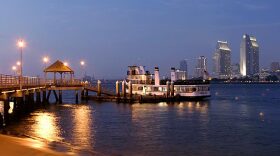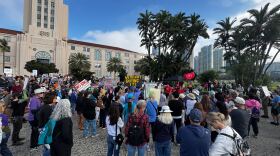FARAI CHIDEYA, host:
I'm Farai Chideya, and this is NEWS & NOTES.
In our Africa update, we take a look at fighting in the eastern Congo and a political battle for leadership of South Africa's ruling party.
Edmond Keller joins us this week. He is director of Globalization Research on Africa at the University of California, Los Angeles. Welcome.
Prof. EDMOND KELLER (Political Science, University of California, Los Angeles; Director, Globalization Research on Africa): Thank you.
CHIDEYA: So, rebels and government troops are battling it out in eastern Congo; tens of thousands of Congolese have been displaced by the fighting including this 21-year-old man.
Mr. MESERER SADIKI(ph): My Name is Meserer Sadiki. I'm from Rugali. We passed the night in the church. There is no beds, nothing, on the floor only. Children are suffering from hunger and cholera and other illness. To the Congolese government, I can ask them the peace. If they are not able to give us peace, they can give us food to eat and other things. We are suffering here.
CHIDEYA: So you're listening directly to a plea from a young man. What's happening, briefly, in the region right now?
Prof. KELLER: Well, it's a very complex ongoing civil conflict. It all began in 1994 when Tutsi people from Rwanda fled into - I'm sorry, Hutu people fled into the DRC. And they…
CHIDEYA: That's the Democratic Republic of Congo.
Prof. KELLER: Democratic Republic of Congo. And after the Rwanda Patriotic Front took power in Rwanda, they were subject to invasions from the DRC with these Hutu rebels. And so, in hot pursuit, they went in to the Congo along with support from Uganda and other countries and tried to root out these Hutu rebels.
But still, there were many Tutsi who were also in the Congo, and they were set upon by Hutu living in refugee camps there, and they've been systematically targeted and attacked. And so there has emerged this militia group by - headed by a person by the name of Laurent Nkunda, and he is dedicated to protecting the Tutsi living in the eastern Congo, and he's fighting these Hutu rebels.
At the same time, the government wants to get control of that area too, and so, it is fighting, not only the Hutu rebels, but also Nkunda because it feels that Nkunda is infringing on his - its responsibility. And you…
CHIDEYA: So…
Prof. KELLER: And you have now also a United Nations force that is there to help protect the regional capital Goma. And this force is unusual in a sense that it has a mandate to use force to protect the citizens.
CHIDEYA: So, Professor, it sounds like there has been a spillover or extension of some of the conflict that we saw in Rwanda. And a lot of people in the U.S. are familiar with Don Cheadle's turn in "Hotel Rwanda." Is it common for some of these ethnic differences or historical differences to spillover from nation to nation?
Prof. KELLER: Absolutely. It has become much more common, particularly with the ending of the Cold War, and then the continent as a whole became awash in small arms. And so - and also, it became quite common for rebel groups to take advantage of whatever natural resources were there, to sell those resources to equip their rebel forces, and so forth and so on.
And these have a tendency to spillover border and - at borders, and it has to do a lot with the relationships among ethnic groups, let's say, for example, Nkunda's group is a Hema group, which is related to the Tutsis in Rwanda and also to similar people in Uganda.
CHIDEYA: What's the best hope for peace, in your opinion?
Prof. KELLER: Well, to disarm all the combatants. But that's difficult to do because the Democratic Republic of Congo, historically, has been a country in which governance - national governance did not spread to the far reaches of the country, and there are some areas there that are way out of control of the government.
CHIDEYA: Let's move south, and we're going to look at a high profile bid for leadership in the economic engine of Africa. We're talking about South Africa, and the battle for leadership is at the African National Congress or ANC; that party took power after the end of apartheid with Nelson Mandela at the helm. And now they're meeting to discuss party leadership in today's South Africa. The battle is between former friends and now rivals President Thabo Mbeki and Jacob Zuma.
Steve Friedman of the Institute for Democracy in South Africa says that in past ANC elections, presidents were chosen by other leaders, not delegates.
Mr. STEVE FRIEDMAN (Political analyst, Institute for Democracy in South Africa): It's not impossible that this election will turn the ANC into a far more vigorous, free democratic organization in which grassroots people will feel they have far more of a say.
CHIDEYA: So the voting's underway; we could hear who wins as early as today. Former ANC deputy president Jacob Zuma is favored to win. What is the significance of his role in the party and of this race?
Prof. KELLER: Well, you might think that ethnicity was involved here because Mbeki is a Xhosa and Zuma is a Zulu. And the Zulus are that largest ethnic group in the country, okay?
CHIDEYA: And Mandela was also a Xhosa, right?
Prof. KELLER: He's also - Mandela was also a Xhosa, or he is a Xhosa. But, in any case, it's not that at all. It's all - it all has to do with ideology and philosophy. Zuma is a long-time representative of the far-left wing of ANC. He has labor support. He has the South African Communist Party support. He has a large support base among the African National Congress Youth Wing. Mbeki is seen as a sort of a pro-white business leader whereas Zuma is seen as a man of the people.
CHIDEYA: Nonetheless, one of the big controversies has centered around a sexual assault case. He was exonerated, but many people saw his behavior, including how he treated the specter of AIDS, the woman who was HIV positive, as totally irresponsible. Is that affecting things at all?
Prof. KELLER: No. No. It doesn't seem to be affecting things at all, although it could very well become a factor later on. All of which you've said about his behavior is absolutely correct. He also has been implicated in a very serious corruption scandal involving the sale of illicit arms, and that may surface again.
But for the moment, you know, the common person in South Africa, the common black person wants change. And the youth wing has been very adamant in attacking the old line leadership of the ANC. And that has caused some of the tensions at the congress.
CHIDEYA: What's the - at stake for this nation?
Prof. KELLER: Well, if Mbeki wins the leadership, he will get a chance to dictate who becomes the next presidential candidate for the ANC. But if Zuma wins, he'll be in a good position to advance himself in the presidential election.
CHIDEYA: Well, Professor Keller, we'll keep an eye on it. Thank you so much.
Prof. KELLER: Thank you.
CHIDEYA: Edmond Keller is a professor of political science and director of the Globalization Research Center on Africa at UCLA. He was at our NPR West Side studios. Transcript provided by NPR, Copyright NPR.





